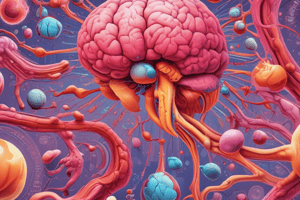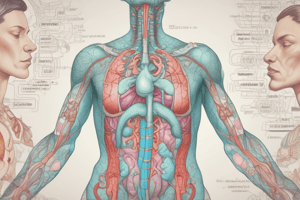Podcast
Questions and Answers
Which gland is responsible for producing melatonin?
Which gland is responsible for producing melatonin?
Where are the adrenal glands located?
Where are the adrenal glands located?
Which gland controls growth and development, as well as stimulates other glands?
Which gland controls growth and development, as well as stimulates other glands?
What is the specific function of the pancreas in relation to hormone production?
What is the specific function of the pancreas in relation to hormone production?
Signup and view all the answers
Which hormones regulate metabolism by breaking down food for energy and growth?
Which hormones regulate metabolism by breaking down food for energy and growth?
Signup and view all the answers
What is the primary function of sex hormones like estrogen, progesterone, and testosterone?
What is the primary function of sex hormones like estrogen, progesterone, and testosterone?
Signup and view all the answers
Which gland can be affected by tumors or other issues, leading to growth problems or hormone imbalances?
Which gland can be affected by tumors or other issues, leading to growth problems or hormone imbalances?
Signup and view all the answers
What condition affects the body's ability to produce or use insulin, leading to high blood sugar levels?
What condition affects the body's ability to produce or use insulin, leading to high blood sugar levels?
Signup and view all the answers
Which hormones help regulate the body's response to stress, such as the 'fight or flight' response?
Which hormones help regulate the body's response to stress, such as the 'fight or flight' response?
Signup and view all the answers
What are the primary components of the endocrine system that produce sex hormones in males and females?
What are the primary components of the endocrine system that produce sex hormones in males and females?
Signup and view all the answers
Study Notes
The endocrine system is a complex network of glands and hormones that plays a crucial role in the regulation of various bodily functions. It is responsible for controlling growth, metabolism, immune response, and reproduction, among other essential processes. The endocrine system consists of endocrine glands, which produce hormones, and these hormones travel through the bloodstream to reach target cells throughout the body.
Endocrine Glands
There are several endocrine glands in the human body, each with its specific function:
-
Pituitary gland: Located at the base of the brain, the pituitary gland controls growth and development, releasing hormones that stimulate other glands, such as the thyroid and adrenal glands.
-
Pineal gland: Located at the center of the brain, the pineal gland produces melatonin, a hormone that regulates sleep-wake cycles.
-
Thyroid gland: Located in the neck, the thyroid gland produces thyroid hormones, which regulate metabolism.
-
Parathyroid glands: Also located in the neck, the parathyroid glands produce parathormone, which regulates calcium levels in the body.
-
Adrenal glands: Located above the kidneys, the adrenal glands produce hormones that regulate the "fight or flight" response, stress, and sexual function.
-
Pancreas: Part of the digestive system, the pancreas also produces hormones that regulate blood sugar levels.
-
Gonads: These include the ovaries in females and the testes in males, which produce sex hormones.
Hormones
Hormones are chemical messengers produced by the endocrine glands that travel through the bloodstream to reach target cells throughout the body. They play a crucial role in the regulation of various bodily functions, including:
-
Growth and development: Hormones like insulin-like growth factor and growth hormone stimulate growth and development in children and adolescents.
-
Metabolism: Hormones like thyroid hormone and insulin regulate metabolism, which is the process of breaking down food for energy and growth.
-
Immune response: Hormones like cortisol and adrenaline help regulate immune response, which is the body's defense against infection and disease.
-
Reproduction: Sex hormones like estrogen, progesterone, and testosterone regulate the reproductive system and sexual function.
-
Stress response: Hormones like cortisol and adrenaline help the body respond to stress, such as the "fight or flight" response.
Endocrine System Disorders
Disorders of the endocrine system can be caused by a variety of factors, including genetics, injury, illness, and tumors. Some common endocrine system disorders include:
-
Diabetes: A condition where the body has trouble producing or using insulin, leading to high blood sugar levels.
-
Thyroid disorders: Conditions like hyperthyroidism and hypothyroidism can affect the production and regulation of thyroid hormones.
-
Pituitary disorders: Tumors or other issues can affect the pituitary gland, leading to growth problems or hormone imbalances.
-
Adrenal disorders: Conditions like Cushing's syndrome and Addison's disease can affect the production and regulation of adrenal hormones.
-
Gonadal disorders: Conditions like menstrual irregularities and infertility can affect the reproductive system and sexual function.
Understanding the endocrine system and its role in the body is essential for maintaining overall health and well-being. By knowing how hormones regulate various bodily functions, individuals can better understand their body's needs and seek appropriate medical care when necessary.
Studying That Suits You
Use AI to generate personalized quizzes and flashcards to suit your learning preferences.
Description
Explore the complex network of endocrine glands, hormones, and their role in regulating bodily functions such as growth, metabolism, immune response, and reproduction. Learn about specific endocrine glands, the functions of hormones, and common disorders of the endocrine system.




